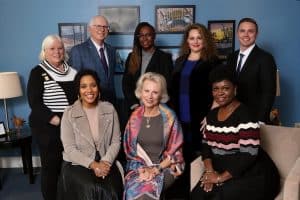Commentary
Commentary: CCSD School Board Considers Prayer, But Ignores Students
By: Bonnie Cleaveland, PhD
Secular Humanists of the Lowcountry
American Atheists State Director, South Carolina
The Charleston County School District Board of Trustees (right) voted 6-1 at the January 10th Committee of the Whole meeting to allow board members to pray publicly at board meetings. The policy won’t take effect until after a second vote, likely at their next meeting, Monday January 23rd.
The board members continually referenced legal precedent related to legislative prayer. They seemed unaware that courts have been careful to distinguish legislative invocations from adult religious expression in school district business. The courts consider children particularly vulnerable to religious coercion.
Only board members Tempel and Waters mentioned that the board represents families of diverse beliefs. Otherwise, board members were solely focused on their own religious expression. It doesn’t appear that the board has consulted, or even heard from, students of minority belief groups.
How does it feel to be a Jewish or Muslim student attending the board meeting to celebrate an accomplishment, only to hear prayers that, while they don’t reference Jesus, are clearly Christian in format and content? The board doesn’t seem to know.
I’m a 54-year-old secular humanist who attended public schools in the South. When I was in school, we had Christian prayers and Christmas break. We even sang Christian songs in our chorus. I was never offended, because I was a child. Instead, I felt a sense of being excluded, of being different, even in a school district that was mine as much as it was theirs.
Even among Christians, there are many who believe that both church and state are stronger when each leaves the other alone. Many Christians believe that they should not display prayer publicly, but pray amongst themselves.
In South Carolina, three percent of us belong to non-Christian faiths, and 19% are religious “nones” who are atheist, agnostic, and those with no religion. Nevertheless, it’s not unusual to have a school board that is 100% Christian.
South Carolina’s majority Christian school boards are not likely to consider students’ minority beliefs. As such, it’s essential that the State Department of Education, the South Carolina School Board Association, and individual district legal departments train newly elected board members not only to follow the law, but also to advocate for students of varying faiths and of no faith. I think we can all agree that respect for our students should guide our school board’s every action.

























